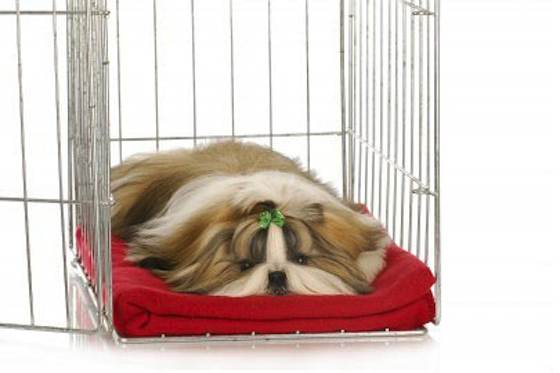- MENU
- HOME
- SEARCH
- WORLD
- MAIN
- AFRICA
- ASIA
- BALKANS
- EUROPE
- LATIN AMERICA
- MIDDLE EAST
- United Kingdom
- United States
- Argentina
- Australia
- Austria
- Benelux
- Brazil
- Canada
- China
- France
- Germany
- Greece
- Hungary
- India
- Indonesia
- Ireland
- Israel
- Italy
- Japan
- Korea
- Mexico
- New Zealand
- Pakistan
- Philippines
- Poland
- Russia
- South Africa
- Spain
- Taiwan
- Turkey
- USA
- BUSINESS
- WEALTH
- STOCKS
- TECH
- HEALTH
- LIFESTYLE
- ENTERTAINMENT
- SPORTS
- RSS
- iHaveNet.com: Pets
by John Wade

If a puppy hasn't been part of your family for a long time, you might think crate-training your bundle of joy is cruel.
On the contrary: Most breeders and trainers recommend crate-training because domesticated dogs inherited the den instinct from their wild ancestors.
As long as your puppy equates his crate with his den, it becomes a safe haven for him. When used correctly (not as punishment), a crate functions as your puppy's cozy pseudo-shelter and helps you manage everything from humane housebreaking to protecting your household furniture.
Buying and Using the Correct Crate
I recommend you buy a few crate sizes -- puppy, adolescent, adult -- to accommodate your pet's growth. The right size allows your puppy to stand up, turn around, eat and sleep, but it is not so big that he can eliminate at one end. I don't introduce bedding or fabric toys too early, as puppies can easily shred them.
Introduce your puppy to his crate with your happy voice and place him inside with a favorite toy or treat. Look for every little thing that will provide a positive association with the crate: feeding, toys and praise. Keep the crate, or multiple crates, central to all household activities so he connects the crate with your companionship -- and so you can hear him if he needs to go outside to do his business.
The Single Best Aid in Your Training Toolbox
Housetraining is just one of the many ways you can use a crate. A dog bonded to his crate:
- Travels with less stress
- Handles household moves better
- Has a familiar place to heal if your veterinarian recommends prolonged rest from an injury
- Gives you peace of mind knowing your dog is comfortable and safe while you're away
- Adapts more easily to staying in a strange home or hotel
Crates Are Not Jails
If your puppy thinks his crate is a prison, not only will he not like it, but it also won't work as an effective training tool. Here's how you shouldn't use a crate:
- Never leave your puppy in a crate for longer than you know he can wait to eliminate
- Never confine your puppy for long periods of time without an equal balance of non-crate time
- Never use the crate to isolate him from his family (you!)
- Never let children pester or tease the puppy in his crate
- Never leave your puppy with the impression that his new family disappears every time he is crated; introduce separation gradually
As long as your puppy equates his crate with his "safe place," his crate will be a welcome part of his life.
AUTOS | HOBBIES | EDUCATION | FAMILY | FASHION | FOOD & RECIPES | HOME DECOR | RELATIONSHIPS | PARENTING | PETS | TRAVEL | WOMEN
PET STORIES and PET ARTICLES ...
- Dogs and the Workplace
- Exercise and the Small Dog
- Your Dog Doesn't Listen?
- Bark Management 101
- Stop Your Dog From Begging
- Are Dog Shows for You?
- Meet the Penn-MaryDel Foxhound
- What to do with a dog that won't stop barking
- 4 Tips to Keep Your Dog's Coat Healthy
- How to Train Your Dog to Hunt
- The Rottweiler: Your Family's Best Friend
- Teach Your Dog to Swim
- Show Dog Skills for Any Mutt
- Beginner's Guide to Dog Agility
- Meet the Petit Basset Griffon Vendeen
Article: Copyright © All rights reserved.
Dogs: Should You Crate-train Your Puppy?